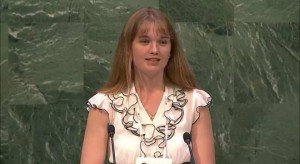Many Languages, One Alumna
-
-
slice.mit.edu
Filed Under
Recommended

Amariuta says her interest in language was sparked in high school. “At home, we only spoke English. When I got to high school and saw my friends come from a non-English speaking family, I thought that I had missed an amazing opportunity to learn a foreign language,” she says. Amariuta began studying Vietnamese, Korean, and Latin, and when she got to MIT she added French and then Russian to her list of languages.
Amariuta’s Russian professor, Maria Khotimsky, urged her to participate in the MLOW contest. “She suggested that I write the essay in French, with which I have much more experience. I decided to write essays in both languages. In the end, my Russian essay was selected,” she says.
For the contest, winners selected from multiple countries are invited to the United Nations to present a final speech as a team on given topic. The students were given one day to work on their speeches as a group. Amariuta worked with Russian speakers from places like Ghana, Vietnam, and Georgia to present a speech—in Russian—on sustainable distribution of potable water and availability of sanitation. “Given the short amount of time we had to work with our team and write our speeches, I’m very happy with how everything turned out,” she says.
Amariuta continues to put her Russian to good use—she’s currently finishing an internship in Algorithmic Biology Lab at Saint Petersburg Academic University in the Russian Academy of Science.
In the fall, Amariuta will be a student at Harvard Medical School in the Bioinformatics and Integrative Genomics (BIG) PhD program—a choice that she credits to a MISTI opportunity. “When I worked at EPFL in Lausanne, Switzerland, I discovered the faculty of computational and statistical genetics and I knew that I had found the field I wanted to work in,” she says.
As far as languages, Amariuta is working to add one more to her resume—Romanian, a language that she’s learning from her dad, a native speaker.







